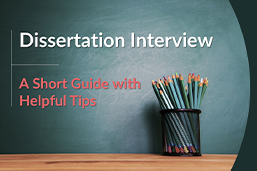
A dissertation interview is a vital tool in academic research, often serving as a primary source in data collection. These structured, semi-structured, or unstructured dialogues provide detailed and firsthand insights into the research topic, supplementing or extending other research methods. The design, execution, and analysis of dissertation interviews require careful planning and a clear understanding of the research question to ensure they contribute effectively to the overarching thesis. This guide aims to guide students with helpful tips for dissertation interviews.
Definition: Dissertation interview
A dissertation interview is a method of primary data collection used in academic research, typically undertaken for a dissertation or thesis. It can be in the form of a structured, semi-structured, or unstructured interview between the researcher and the interviewee(s), with the goal of gaining detailed, firsthand insights into the research topic. The interview questions are formulated based on the research objectives, and the responses are used to support or explore the thesis argument in depth. The information derived from such interviews often complements secondary data or may serve as the primary basis for the research findings.
Including a dissertation interview
You have conducted interviews as part of your descriptive study for your dissertation. How do you incorporate them? There is a high possibility you do not know what is anticipated since no one ever told you.
Transcribing interviews is a condition for using them in dissertations. This may be accomplished with the use of transcribing software. The transcripts of the interviews might be included as an appendix. Due to the length of the appendix, it may be necessary to submit it as a separate document after discussing your dissertation interview with your supervisor. It is essential to have proof that interviews were conducted.
Referring to a dissertation interview
Include the transcripts of the interviews in an appendix, and then refer to them throughout your dissertation via paraphrasing. This is how paraphrasing works:
There may be cases when you cannot include a dissertation interview transcript in your appendix. If we cannot make any references to the interview, it may be cited in the following way if you are using the APA format.
Quoting a dissertation interview
You must use quotation marks if you take someone else’s statements in a dissertation interview. Finding fascinating quotations will be much simpler if you understand how to pull useful data out of the individual during the dissertation interview. It’s important to maintain professionalism throughout the dissertation interview.
Using the name of the interviewee from the dissertation interview
Do not copy down the interviewee’s name without considering these two things:
| Permission to Mention the Name | When to Mention the Name |
| Before including an interviewee's identity in a dissertation, the first step is to answer the following: • Discuss if the interviewee wants their name changed and get consent. • For example, if you have interviewed a potential employee and the candidate prefers that their employer not see the responses • This may also occur if the interviewer asks invasive personal inquiries |
The second consideration during a dissertation interview is whether the name should be mentioned: • Is there anything new that it reveals that might further your investigation? • When the interviewee is a random individual met on the road, the • A notable exception is if you have interviewed a high-profile executive, such as the managing director of a major company.3 Here, it would be helpful to provide a brief overview so the dissertation's audience is gets an idea of him |
If the identity is important to the study and you have obtained the interviewee’s consent to use it, then you can go ahead. You may use a description instead if you are not authorized to use the name.
FAQs
Use a transitional phrase like “according to” or another reference when introducing your interview in the piece. Likewise, tailor your responses to the particular dissertation interview format you are using. Doing so will give your paper a more credible and convincing character.
Use two or three queries to get started. Research may become overwhelming in scope if excessive questions are asked. For this reason, you should begin with no more than two or three research topics, but some studies may have more.
They normally take 30 minutes to a few hours to complete and are only done once. It’s common practice in many fields to conduct interviews to gather information.
The truth is that defending a dissertation is tough and that some students have theirs turned down. All the academics showing you the ropes on how to write a dissertation that will get you accepted have been rejected at some time in their careers.
